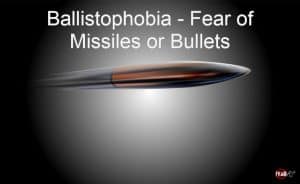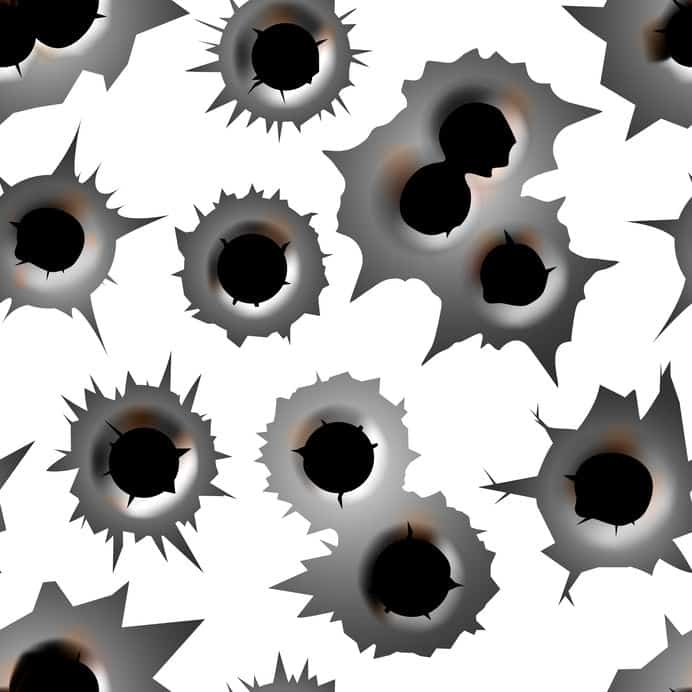Share This Article
Excessive Fear of Missiles or Bullets
People are respectful and wary of guns, and for good reason. But what if merely seeing a gun can cause you to panic?
Do you find yourself getting dizzy after reading yet another headline about a mass shooting? When you watch an action film where the hero gets riddled with bullets, can you at times feel the pain of the injury?
You may wonder, what if you actually see someone get shot in real life? Or worse, what if you have to deal with a bullet wound yourself?
When a car backfires, do you feel your heart pounding in your chest? Are your palms damp? Do you have cold sweat running down your back? If you hear a loud bang in a shopping mall, do you run for cover?
Those around you may not understand what’s going on. And you’re too embarrassed to admit it to yourself, but there’s a problem. To grow out of this fear, first try to identify why you feel such intense fear of bullets and projectiles. Once that’s done, you can to learn to overcome it.

What Is Ballistophobia?
Ballistophobia refers to the fear of missiles, bullets, and guns. Anything which could hurt you that is forced out like a bullet or moves at high speed can trigger this reaction.
The fear comes down to this: being shot.
Unless you’re in the military or police force, the likelihood of getting a gunshot wound is low. The average American is more likely to die from Alzheimer’s disease, cancer, diabetes, or a heart attack. Having guns in the house is one factor that can increase the chances of getting shot. But people who suffer from ballistophobia seldom own guns in the first place.
This condition can arise in those suffering from post traumatic stress disorder (PTSD), which is common in soldiers and law enforcement officers. But it can also come out of the blue. Genetics, biology, and brain chemistry play an important role as well. If you have someone close to you who has a fear of missiles, guns, or bullets, you’re at a higher risk to develop this phobia too.
Symptoms of Ballistophobia
Each case is unique, just as we all have different ways of interpreting images and sounds connected to missiles and bullets. A scene that may terrify one viewer may cause a milder reaction in someone else.
It can be challenging to diagnose ballistophobia, because different people show such a wide range of symptoms. They can be mental, emotional, or physical and range from mild anxiety and fear to panic attacks.
Mental/Emotional Symptoms
- Shuddering at the thought of missiles or bullets
- Avoiding TV shows and video games with bullets and missiles
- Not able to function normally due to constant anxiety
- You are aware that your fears are unreasonable, but you have no control over them
- Running away from the cause of fear
- Fear of fainting
Physical Symptoms
- Increased heart rate
- Dry mouth
- Shaking
- Shortness of breath
- Dizziness
- Nausea or an upset stomach
- Feeling a knot in your chest
- Numbness or tingling feeling
- Hot and cold flashes (as if you’ve run for miles and your face feels cold/warm)
How Can I Deal with Ballistophobia?
One of the best ways to overcome ballistophobia is to accept that you have this fear and study your thinking patterns. Seriously consider why this fear is irrational and learn to identify fearful thoughts as they happen.
If you think you can trust someone, share your fears with them. They can listen to you which can help you feel more safe. Sometimes, all you need is to remove all those negative emotions from the mind. You can even write down your feelings in a journal. Once it’s on paper, you’re less likely to continually repeat those thoughts.
Try watching an action movie with a trusted friend or family member. It could help you get used to the idea of people getting injured by guns or missiles. After each scene, look around and see that you’re safe and remind yourself that what you’re watching is a work of fiction. It’s only a means of entertainment; nobody’s going to harm you.
Seeking Professional Help
Ballistophobia ranges from mild to severe, so when you think you’re losing control over your reactions, consult a professional. Ask your family doctor to suggest to you someone who specializes in phobias.
Professionals make use of several different treatment options that help people overcome their phobias. Behavioral therapy is the most common treatment. It employs systematic desensitization, a method that aims to expose you to your fear and slowly get you used to it. Therapists will also teach you how to relax when you come face to face with bullets, missiles, or images of them. These strategies allow you to control and manage your reactions better.
The therapist can help you work on your thoughts and feelings. Here’s an example. When you experience anxiety or dizziness in response to your fear, your body feels as if you are in danger. Just telling yourself that “It’s okay, it’s just dizziness” can replace that feeling with safety and calm.

Cognitive behavioral therapy helps to change your thinking patterns and your actions related to them. It could take about 10 to 20 weeks to see a marked improvement and up to a year to see a significant change in the way you react.
Of course, the results of these treatments depend on your therapist and on how well you respond to the therapy. Other options are available, including medications, which are sometimes used along with other therapy methods.
How to Avoid It Altogether
As we know, you may not be guaranteed a 100 percent cure for your phobia. That may be in part because certain therapies work on the symptoms and not the root of the issue. A therapist can help you, but you also have to put in the effort to deal with ballistophobia.
Alongside the therapy, it’s good to continue with positive self-talk, writing your thoughts down in your diary, and meditation. Meditation involves deep breathing, which can help you relax when you encounter a trigger for your phobia. The next time you get a dizzy spell or shortness of breath, remember these tips.
In Conclusion
Guns are often featured in the news, movies, and TV shows, so learning to deal with this fear can lessen your stress. You may not get the hang of it immediately, but don’t worry. It requires time, patience, and a strong will to conquer your phobia. Eventually, you’ll find yourself rooting for the hero as he defeats the villains in a gunfight.




